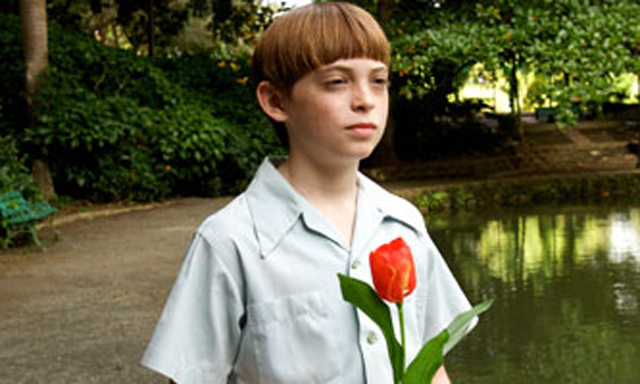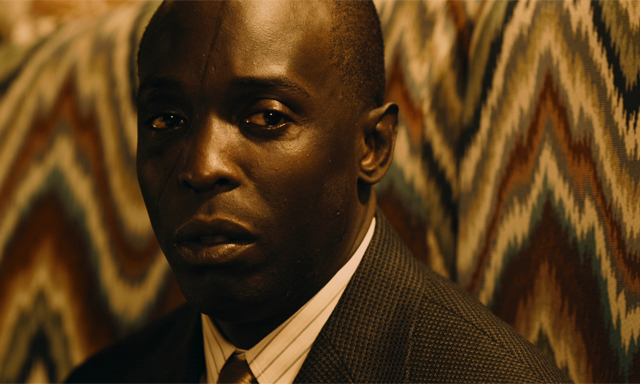 From Happiness to Wartime
From Happiness to Wartime
Todd Solondz is one of contemporary America's most important film directors. Peter Machen spoke to him about Life During Wartime, his sequel of sorts to the groundbreaking 1998 film Happiness
Director Todd Solondz has the reputation of being the enfant terrible of American cinema. But this must surely be linked to his provocative style of film-making rather than his personality, because in conversation he is unfailingly nice, polite to a fault, and entirely without arrogance.
His films, on the other hand, are not polite, although the many viewers who think that they're sick and perverted, are really, really not getting the point. Much of which is precisely that the films ride ramshod over the veneer of politeness and manners that coats middle-class life in order to get to the raw emotional reality of his characters who, like so many human beings, don't always behave terribly well.
Solondz, who had nearly given up on film-making after a well received student film and an unhappy studio experience which left him very unsatisfied with the process, found massive critical success with two breakout films, Welcome to the Dollhouse in 1996 and Happiness in 1998. Dollhouse tells the story of an unattractive 7th grader as she struggles to cope with her adolescent world, while Happiness was an interlocking multiple narrative, which together with Paul Thomas Anderson's Magnolia, provided the blueprint for an entire genre of contemporary film, both commercial and independent. But most people seem to remember Happiness for its portrayal of a child molester who Solondz allowed to remain human, and which many indignant commentators have described as 'sympathetic'.
Solondz makes films that are extremely gentle in their execution but brutally unflinching in the exploration of their characters' private lives and interior realities. And so we see a lot of bad behaviour, often masquerading, as it does, as politeness. Another thing that defines his films is that in his bluntly honest exploration of human interaction, he grants a full complexity to his young characters. This simple approach has revolutionised American cinema, paving the way for a cavalcade of independent films, many of which have been far more commercial than Solondz' films.
I spoke to the director about his latest film Life During Wartime, which returns to the characters that populated Happiness, except that this time round, they're not only a decade older but played by an entirely different set of actors.
Peter Machen: Todd, your films are often descibed – or written off – as perverted and sick, but for me they are very moral films – a call for a kinder, gentler world. Is there any truth to my reading?
Todd Solondz: The movies are all fraught with ambiguity. They're very sorrowful – heartbreaking really – comedies. But because things aren't delineated in sharp blacks and whites, people may perhaps fail to see that there is a moral anchoring, a moral centre, to this world. I understand how, clinically, people may describe the characters as perverted or sick, but I don't look at them through that lens. I see them as all struggling with conflicts, with afflictions, with the struggle to connect. And this is I think what binds them.
PM: Do you love your characters?
TS: You know, some characters more, and some characters less. It really depends on which character, and also on the way in which I love them. But of course I could never invest what I do in my movies if I didn't have such strong feelings, emotionally speaking. If I didn't take them seriously, if they weren't close to my heart, I wouldn't be able to put myself through this process. That said, that doesn't mean I agree all the time with my characters. They don't always say what I would like them to say, or do what I would like them to do. But I try to be truthful to the reality that I've set up, and I accept them with all their flaws, and so forth.

PM: Do you feel that they have a life that is, in a way, independent of you?
TS: Well, I think that's got to be the aim. You know, my personal life is of little consequence. What matters is the way in which this world and these characters can penetrate other people's consciousness, the way in which they connect with others, the interplay that takes place in theatres. With movies, you are always trying to articulate the inner lives of your characters, to articulate things that are very difficult for us to talk about in real life. And I think that's one of the beautiful things that movies can do.
PM: In the States, as far as I could work out, this film was actually released in theatres and on VOD (video on demand) at the same time. Is that true?
TS: I think they did that in the UK. But it opens in New York on July 23rd, and it will open simultaneously in theatres and VOD.
PM: And how do you feel about that?
TS: Well, maybe I'm a little bit of an anachronism, I don't know. I like to go the movie theatre. I like the big dark room and the screen with a projected film, even if I'm the only one who shows up to the 3 o clock matinee. It's a very special place for me - it's what movies are about for me. The only time I watch movies on DVD is for work – if I have to check on an actor, or check on a cinematographer. It's really only for homework that I would actually watch a DVD on TV like that. For pleasure, I have to go to the movie theatre. But I think a lot of other people are not quite so fastidious as I am.

PM: Back to your film. Was your decision to use an entirely different cast in any way influenced by your film Palindromes (in which the same character is played by actors of radically different physicality and even gender)?
TS: Um, I don't know consciously. But I do know that maybe it gave me a little bit more courage having done that. If had I cast the same actors in these parts it would have been a very different movie. One of the things that happens when you do that is that there's always this very powerful subliminal message about mortality. Now that's something that's very special, but it's not really what I wanted to pursue here. I was much more interested in freeing myself from the constraints of the literalness of what I had established in my earlier work, so that I could feel free to reinvent and reshape the characters, something that I could never do using the same actors.
PM: Palindromes got quite a lukewarm reception. I watched it again last night and I thought it was magnificent. And I get the impression that you were very fond of the film when making it. Were you upset by the critical response?
TS: Well, you know, I have a weak character. If people like the movie, I feel better and happy. And if they don't, I feel a little bit sad. But I loved the film, and that makes me more protective of it. There were champions of the film. It had many people who spoke very vociferously on its behalf, very passionately. But I think a lot of people, at the same time, were very put off – by the content, the way it was handled. And you know, I can never anticipate how others will respond. I can only put out there what I can stand by and take pride in, and hope for the best.
© PETER MACHEN 2017